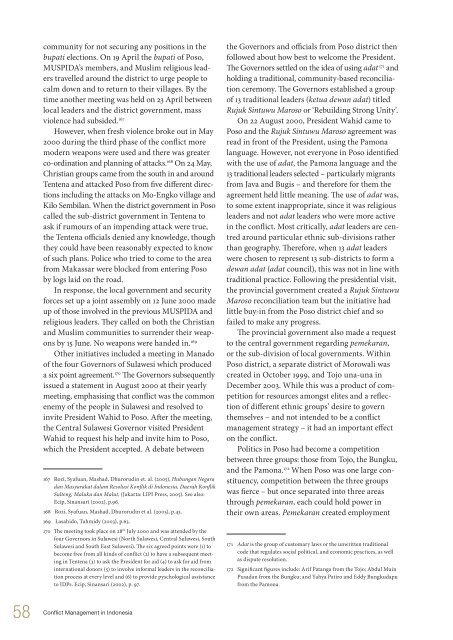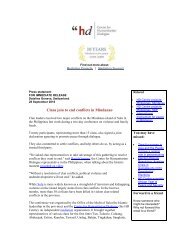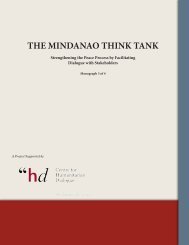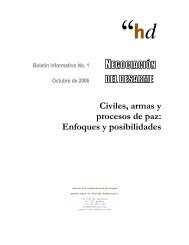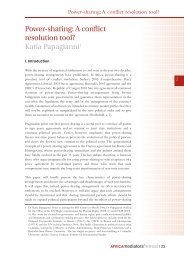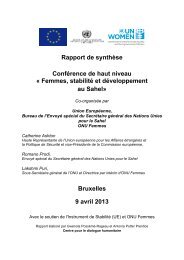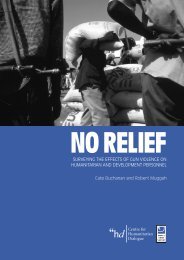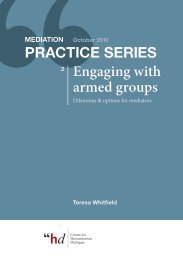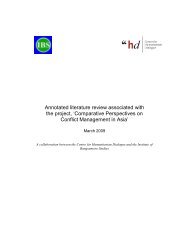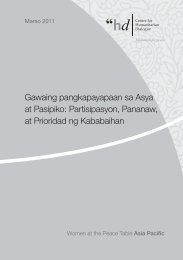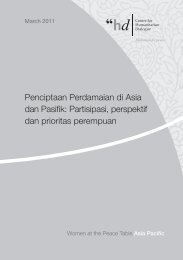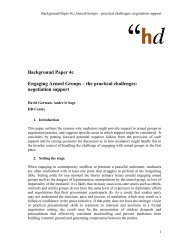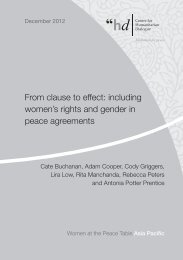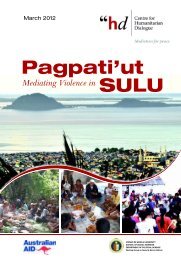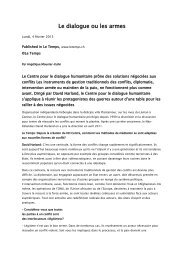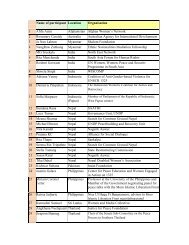Conflict Management in Indonesia â An Analysis of the Conflicts in ...
Conflict Management in Indonesia â An Analysis of the Conflicts in ...
Conflict Management in Indonesia â An Analysis of the Conflicts in ...
You also want an ePaper? Increase the reach of your titles
YUMPU automatically turns print PDFs into web optimized ePapers that Google loves.
community for not secur<strong>in</strong>g any positions <strong>in</strong> <strong>the</strong><br />
bupati elections. On 19 April <strong>the</strong> bupati <strong>of</strong> Poso,<br />
MUSPIDA’s members, and Muslim religious leaders<br />
travelled around <strong>the</strong> district to urge people to<br />
calm down and to return to <strong>the</strong>ir villages. By <strong>the</strong><br />
time ano<strong>the</strong>r meet<strong>in</strong>g was held on 23 April between<br />
local leaders and <strong>the</strong> district government, mass<br />
violence had subsided. 167<br />
However, when fresh violence broke out <strong>in</strong> May<br />
2000 dur<strong>in</strong>g <strong>the</strong> third phase <strong>of</strong> <strong>the</strong> conflict more<br />
modern weapons were used and <strong>the</strong>re was greater<br />
co-ord<strong>in</strong>ation and plann<strong>in</strong>g <strong>of</strong> attacks. 168 On 24 May,<br />
Christian groups came from <strong>the</strong> south <strong>in</strong> and around<br />
Tentena and attacked Poso from five different directions<br />
<strong>in</strong>clud<strong>in</strong>g <strong>the</strong> attacks on Mo-Engko village and<br />
Kilo Sembilan. When <strong>the</strong> district government <strong>in</strong> Poso<br />
called <strong>the</strong> sub-district government <strong>in</strong> Tentena to<br />
ask if rumours <strong>of</strong> an impend<strong>in</strong>g attack were true,<br />
<strong>the</strong> Tentena <strong>of</strong>ficials denied any knowledge, though<br />
<strong>the</strong>y could have been reasonably expected to know<br />
<strong>of</strong> such plans. Police who tried to come to <strong>the</strong> area<br />
from Makassar were blocked from enter<strong>in</strong>g Poso<br />
by logs laid on <strong>the</strong> road.<br />
In response, <strong>the</strong> local government and security<br />
forces set up a jo<strong>in</strong>t assembly on 12 June 2000 made<br />
up <strong>of</strong> those <strong>in</strong>volved <strong>in</strong> <strong>the</strong> previous MUSPIDA and<br />
religious leaders. They called on both <strong>the</strong> Christian<br />
and Muslim communities to surrender <strong>the</strong>ir weapons<br />
by 15 June. No weapons were handed <strong>in</strong>. 169<br />
O<strong>the</strong>r <strong>in</strong>itiatives <strong>in</strong>cluded a meet<strong>in</strong>g <strong>in</strong> Manado<br />
<strong>of</strong> <strong>the</strong> four Governors <strong>of</strong> Sulawesi which produced<br />
a six po<strong>in</strong>t agreement. 170 The Governors subsequently<br />
issued a statement <strong>in</strong> August 2000 at <strong>the</strong>ir yearly<br />
meet<strong>in</strong>g, emphasis<strong>in</strong>g that conflict was <strong>the</strong> common<br />
enemy <strong>of</strong> <strong>the</strong> people <strong>in</strong> Sulawesi and resolved to<br />
<strong>in</strong>vite President Wahid to Poso. After <strong>the</strong> meet<strong>in</strong>g,<br />
<strong>the</strong> Central Sulawesi Governor visited President<br />
Wahid to request his help and <strong>in</strong>vite him to Poso,<br />
which <strong>the</strong> President accepted. A debate between<br />
167 Rozi, Syafuan, Mashad, Dhurorud<strong>in</strong> et. al. (2005), Hubungan Negara<br />
dan Masyarakat dalam Resolusi Konflik di <strong>Indonesia</strong>, Daerah Konflik<br />
Sulteng, Maluku dan Malut, (Jakarta: LIPI Press, 2005). See also:<br />
Ecip, S<strong>in</strong>ansari (2002), p.96.<br />
168 Rozi, Syafuan, Mashad, Dhurorud<strong>in</strong> et al. (2005), p.43.<br />
169 Lasahido, Tahmidy (2003), p.63.<br />
170 The meet<strong>in</strong>g took place on 28 th July 2000 and was attended by <strong>the</strong><br />
four Governors <strong>in</strong> Sulawesi (North Sulawesi, Central Sulawesi, South<br />
Sulawesi and South East Sulawesi). The six agreed po<strong>in</strong>ts were (1) to<br />
become free from all k<strong>in</strong>ds <strong>of</strong> conflict (2) to have a subsequent meet<strong>in</strong>g<br />
<strong>in</strong> Tentena (3) to ask <strong>the</strong> President for aid (4) to ask for aid from<br />
<strong>in</strong>ternational donors (5) to <strong>in</strong>volve <strong>in</strong>formal leaders <strong>in</strong> <strong>the</strong> reconciliation<br />
process at every level and (6) to provide pyschological assistance<br />
to IDPs. Ecip, S<strong>in</strong>ansari (2002), p. 97.<br />
<strong>the</strong> Governors and <strong>of</strong>ficials from Poso district <strong>the</strong>n<br />
followed about how best to welcome <strong>the</strong> President.<br />
The Governors settled on <strong>the</strong> idea <strong>of</strong> us<strong>in</strong>g adat 171 and<br />
hold<strong>in</strong>g a traditional, community-based reconciliation<br />
ceremony. The Governors established a group<br />
<strong>of</strong> 13 traditional leaders (ketua dewan adat) titled<br />
Rujuk S<strong>in</strong>tuwu Maroso or ‘Rebuild<strong>in</strong>g Strong Unity’.<br />
On 22 August 2000, President Wahid came to<br />
Poso and <strong>the</strong> Rujuk S<strong>in</strong>tuwu Maroso agreement was<br />
read <strong>in</strong> front <strong>of</strong> <strong>the</strong> President, us<strong>in</strong>g <strong>the</strong> Pamona<br />
language. However, not everyone <strong>in</strong> Poso identified<br />
with <strong>the</strong> use <strong>of</strong> adat, <strong>the</strong> Pamona language and <strong>the</strong><br />
13 traditional leaders selected – particularly migrants<br />
from Java and Bugis – and <strong>the</strong>refore for <strong>the</strong>m <strong>the</strong><br />
agreement held little mean<strong>in</strong>g. The use <strong>of</strong> adat was,<br />
to some extent <strong>in</strong>appropriate, s<strong>in</strong>ce it was religious<br />
leaders and not adat leaders who were more active<br />
<strong>in</strong> <strong>the</strong> conflict. Most critically, adat leaders are centred<br />
around particular ethnic sub-divisions ra<strong>the</strong>r<br />
than geography. Therefore, when 13 adat leaders<br />
were chosen to represent 13 sub-districts to form a<br />
dewan adat (adat council), this was not <strong>in</strong> l<strong>in</strong>e with<br />
traditional practice. Follow<strong>in</strong>g <strong>the</strong> presidential visit,<br />
<strong>the</strong> prov<strong>in</strong>cial government created a Rujuk S<strong>in</strong>tuwu<br />
Maroso reconciliation team but <strong>the</strong> <strong>in</strong>itiative had<br />
little buy-<strong>in</strong> from <strong>the</strong> Poso district chief and so<br />
failed to make any progress.<br />
The prov<strong>in</strong>cial government also made a request<br />
to <strong>the</strong> central government regard<strong>in</strong>g pemekaran,<br />
or <strong>the</strong> sub-division <strong>of</strong> local governments. With<strong>in</strong><br />
Poso district, a separate district <strong>of</strong> Morowali was<br />
created <strong>in</strong> October 1999, and Tojo una-una <strong>in</strong><br />
December 2003. While this was a product <strong>of</strong> competition<br />
for resources amongst elites and a reflection<br />
<strong>of</strong> different ethnic groups’ desire to govern<br />
<strong>the</strong>mselves – and not <strong>in</strong>tended to be a conflict<br />
management strategy – it had an important effect<br />
on <strong>the</strong> conflict.<br />
Politics <strong>in</strong> Poso had become a competition<br />
between three groups: those from Tojo, <strong>the</strong> Bungku,<br />
and <strong>the</strong> Pamona. 172 When Poso was one large constituency,<br />
competition between <strong>the</strong> three groups<br />
was fierce – but once separated <strong>in</strong>to three areas<br />
through pemekaran, each could hold power <strong>in</strong><br />
<strong>the</strong>ir own areas. Pemekaran created employment<br />
171 Adat is <strong>the</strong> group <strong>of</strong> customary laws or <strong>the</strong> unwritten traditional<br />
code that regulates social political, and economic practices, as well<br />
as dispute resolution.<br />
172 Significant figures <strong>in</strong>clude: Arif Patanga from <strong>the</strong> Tojo; Abdul Mu<strong>in</strong><br />
Pusadan from <strong>the</strong> Bungku; and Yahya Patiro and Eddy Bungkudapu<br />
from <strong>the</strong> Pamona.<br />
58<br />
<strong>Conflict</strong> <strong>Management</strong> <strong>in</strong> <strong>Indonesia</strong>


